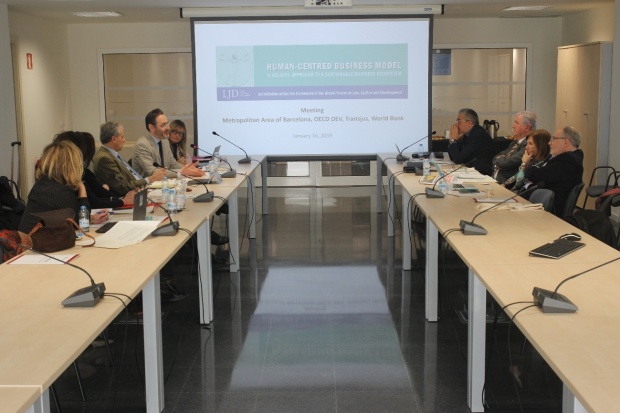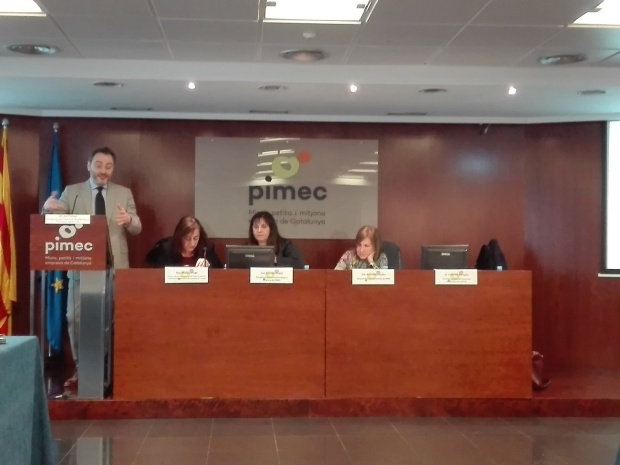On January 16 TransJus took part in two activities with the OECD, the World Bank, PIMEC and the Metropolitan Area of Barcelona.
In the morning session, related to the Human-Centered Business Model, TransJus was represented by the current management alongside with Dr. Marta Ortega and Dr. Eva Andrés, in connection with several areas of research of the institute (on the work developed in the last three years, see: https://transjusblog.wordpress.com/2018/11/19/transjus-in-the-workshop-on-the-guiding-principles-and-corporate-governance/)
Alongside TransJus, the following representatives were also present:
-OECD
Federico Bonaglia, Deputy Director, Development Unit
Marco Nicoli, Special Advisor to the Director
-World Bank
Marta Mueller, Representative of the World Bank, Rome Office
Laurence Coste, Project Manager for the Global Forum on Law Justice and Development, Senior Counsel, Legal Vice Presidency, World Bank
-Barcelona Metropolitan Area
Héctor Santkovsky, Director of Economic and Social Development
Anna Hernández, Head of Innovation
-Innobaix
Luis Bahamonde Falcón, President

The aim of the session was to make progress in the definition of possible pilot tests to be carried out in the metropolitan area of Barcelona, with the academic coordination of TransJus, linked to the Human-Based Business Model in which TransJus has been participating for three years. The discussion was of mutual interest and it was agreed to move forward on the issue, without losing sight of the proximity of scheduled electoral processes and the need for TransJus to receive adequate external funding to develop research and associated tasks in this area.
In an afternoon session, at PIMEC’s headquarters in Barcelona, the PIMEC Women and Enterprise Commission jointly organized a workshop with the TransJus Research Institute of the University of Barcelona and the Organization for Economic Cooperation and Development (OECD) whose main objective was to provide a broad vision of the role of women in the business world from both a local and international perspective.
The workshop was attended by international organisations such as the OECD, the World Bank and the Union for the Mediterranean, all of which work in the field of gender equality in economic and business environments. Starting from the idea that gender equality and the principle of equal opportunities have to be central elements of economic development, the workshop dealt with existing instruments, effective results and the difficulties in complying with them.
The workshop was given by high-level speakers who occupy public positions of international scope, as well as local representatives, representatives of the business sector and the academic world.

After a welcoming speech by Mr. Luís Bahamonde, deputy chairman of PIMEC, and Juli Ponce, Director of TransJus, the first speaker was Mr. Federico Bonaglia, deputy director of the OECD Development Centre, who explained the OECD’s SIGI (Social Institutions & Gender Index), an instrument that measures how legal standards, social norms and practices affect the lives of women and girls around the world. This unique database compares women’s rights and opportunities in 180 countries. Available at: https://www.genderindex.org/ .
Secondly, Mrs. Anna Hernández, Head of Innovation in the Metropolitan Area of Barcelona, highlighted the need to collaborate between public, private and academic institutions, based on solid data and to promote female talent, which due to measurable factual circumstances and measures is lost due to obstacles to gender equality.
Afterwards, Mrs. Iolanda Piedra, president of the Women and Enterprise Commission of PIMEC, closed this first round of interventions, explaining the relevant work of the Commission, which aims to impact on issues such as the salary gap or the quota system, for example.
Finally, Dr. Ortega made a reflection connecting the morning session with this afternoon workshop, referring to the principle of equality within the framework of the Human-Centered Business Model and especially bearing in mind the legal framework of the European Union.
After a pause, the work resumed with a lively debate on the issues dealt with the twenty people present from the business world and academics attending, mostly women.
To conclude, we would like to announce an important recent judicial decision, analysed in a future publication and a new initiative of TransJus, both linked to the gender perspective.
From a legal perspective, it is interesting to note that two recent judicial decisions have included references to the right to the city in their legal arguments for deciding a case. This is the Sentence of the Superior Court of Justice of Madrid of 19 April 2017, appeal no. 1882/2015, and, especially, the sentence of the Supreme Court of Madrid of 10 December 2018, appeal no. 3781/2017, which heard in second instance of the previous one.
In the first case, a municipal urban plan was legally discussed and finally annulled due to the omission of a gender impact report. The reasoning of the court indicates that, without now going into technical details, to reach its conclusion it departed from (Fifth legal basis):
«The primary formulations, already classic, of the so-called by Henri Lefevre «right to the city», formulated in its foundations in the late sixties of last century. This is a right that, from the social context in which it was elaborated, and even interpreted as the immediate antecedent of the right to urban life and from the gender perspective that in this matter concerns us by the mandate of equality contained in the Spanish Constitution, was limited to showing the women inhabitants of the suburbs as mere «sleepy» figures who waited there for the men who went to work in remote areas and returned «shattered».
The Supreme Court, after hearing the appeal against this ruling, declares the legality of the urban planning. But in so doing, it includes the reflection on the right to the city in the 2017 judgment (Third Law basis) and in its fourteenth and fifteenth Law basis it points out how the principle of equal treatment is «an inspiring principle of the new conception of urban development, which demands an adequate planning and directed, among other purposes, to achieve effective equality between men and women».
This urban gender perspective is included in an upcoming publication in which several members of TransJus are involved, as a result of the project promoted by the Public Ministry of Defense of the City of Buenos Aires called «Plurales Ciudades – Plurales Experiencias. Right to the City. Urban Social Justice».
On the other hand, as stated during the session, in the impulse of the new TransJus Living Lab on good regulation (https://transjusblog.wordpress.com/2018/12/05/buen-gobierno-regulatorio-derecho-a-una-buena-administracion-y-living-labs/), the measurement of the gender impacts of regulations is intended to occupy a relevant space for analysis.
TransJus would like to thank the institutions and individuals participating in both activities described for their kindness and interest.
For more information see: http://www.campaign-index.com/view.php?J=EgJSMKGXismGLfVzCt4x2DofaKI2892DpxTkbccyAx6bw&C=s2UsDXABDaSFO7zoXgB4qQ